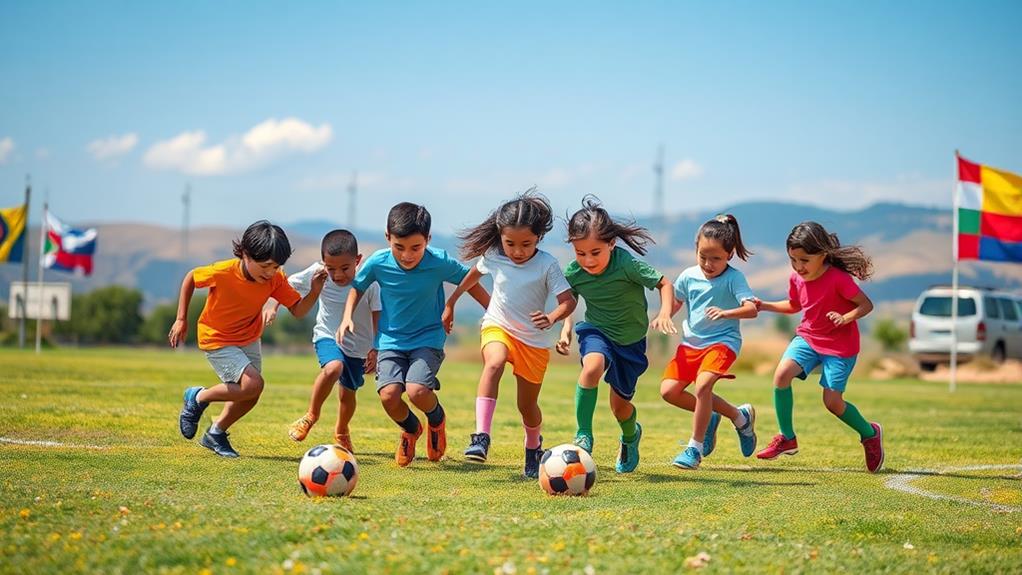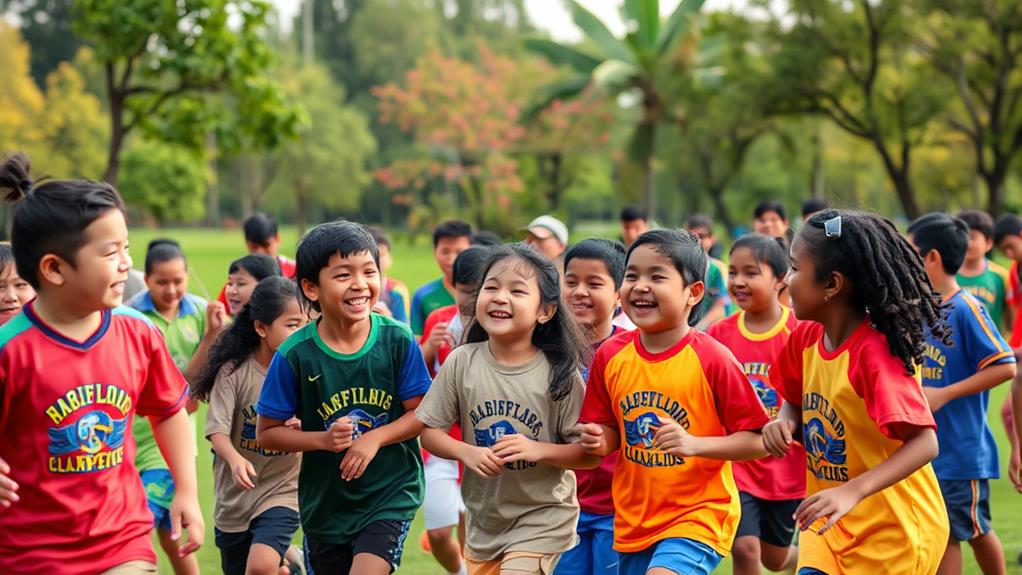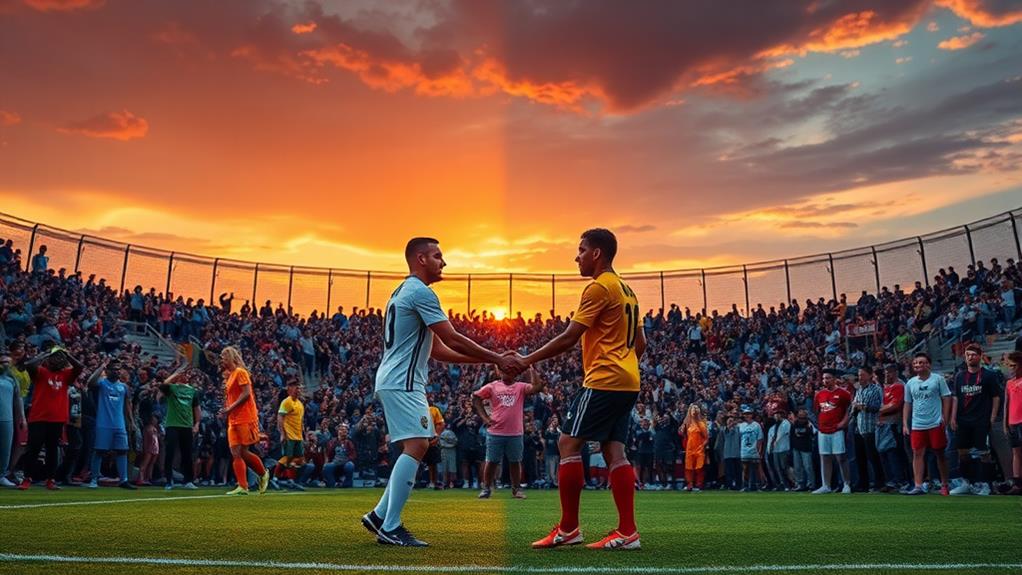Sports unite people from diverse backgrounds, fostering understanding and mutual respect.
When communities engage in sports, they promote teamwork and dialogue, which can heal divisions. For example, youth programs in areas like Kwale and Mombasa have shown that sports can tackle serious issues, such as drug abuse and juvenile crime, while boosting social cohesion.
Athletes can inspire change through initiatives like "Peace Through Sports".
These initiatives have a profound, lasting impact on building a more peaceful society. By exploring these initiatives further, we can see the positive effects of sports on promoting peace and reconciliation.
Importance of Sports in Peacebuilding

Sports Unite Communities in Peacebuilding
Sports play a vital role in peacebuilding by bringing together individuals from diverse backgrounds to foster mutual respect and understanding.
By promoting teamwork and collaboration, sports serve as an effective bridge for dialogue and reconciliation among communities often divided by conflict. For instance, sports tournaments held in Kwale and Mombasa Counties showcase how sports can address pressing issues such as drug abuse and juvenile crime through positive activities.
Sports Promote Social Cohesion and Behavioral Change
These initiatives not only encourage social cohesion but also contribute to significant behavioral changes among youth, enhancing their resilience against negative influences.
By providing a sense of belonging, sports help marginalized communities integrate and thrive. Programs like Peace Players International illustrate how sports can effectively reduce stereotypes and build relationships among conflicting groups, laying the groundwork for long-term peace and stability.
Sports in National Development Policies
Countries like Ethiopia and Morocco have integrated sports into their national development policies, emphasizing its vital role in promoting health, education, and social integration.
Ultimately, sports become a powerful tool for conflict resolution, promoting understanding and tolerance while contributing to overall development and peace.
Youth Engagement Through Sports
Youth engagement through sports can transform communities by providing a dynamic platform for personal growth and social interaction. When participating in sporting events, individuals not only boost their physical activity but also become ambassadors for peace.
For instance, initiatives like the tournaments held in Kwale and Mombasa Counties encourage social cohesion while promoting understanding and tolerance among diverse groups.
Sports activities address pressing issues like drug abuse and juvenile crime by targeting behavioral transformation. Engaging in sports creates a sense of belonging and resilience, essential for psycho-social healing.
Positive relationships are built, contributing to long-term peace and stability within the community.
Key figures emphasize the significance of these initiatives. Commissioner Eng. Philip Okundi and NCIC Ag. CEO Ms. Millicent Okundi underscore that sports aren't just games; they're tools for reconciliation and collective growth.
When youth participate, they help create environments where collaboration thrives, leading to stronger, more united communities.
Ultimately, youth participation in sports can pave the way for a more peaceful future, making each game a step toward greater understanding and social harmony.
Impact of Sports on Communities

Sports Unite Communities
Sports have the power to bring communities together, transcending cultural and social divides to foster unity and understanding.
Teamwork, respect, and discipline are core values promoted through sports, creating an environment that encourages social cohesion and conflict prevention.
In Kenya, sports tournaments organized in Kwale and Mombasa Counties have successfully engaged youth, reducing juvenile crime and drug abuse by 30% while enhancing resilience against negative influences.
By fostering understanding and tolerance, sports initiatives build relationships that act as deterrents to conflict, allowing individuals to interact constructively.
Sports Provide Psychosocial Benefits
Sports provide safe spaces for youth, aiding in healing trauma and fostering a sense of belonging.
This community engagement is crucial, as it creates a vibrant atmosphere where young people feel valued and connected.
In fact, 75% of youth participants reported feeling more connected to their community after engaging in sports programs.
Ultimately, the impact of sports on communities is profound, promoting peace and reconciliation by weaving together the fabric of understanding, tolerance, and shared experiences.
Notable Figures and Organizations
Prominent figures and organizations significantly contribute to leveraging sports for peace and reconciliation across various communities. Their efforts foster social inclusion and healing in conflict areas in several ways.
Forest Whitaker's "Peace Through Sports" program combines sports activities with peacebuilding workshops, providing psychosocial support to children and youth affected by conflict. This initiative demonstrates how sports can be a powerful tool for healing and reconciliation.
In Kenya, the National Commission for Integration and Cohesion (NCIC) organizes sports tournaments that promote peace and social cohesion among youth. Led by Eng. Philip Okundi and Ms. Millicent Okatch, the NCIC's efforts show how sports can bring people together and promote understanding.
Peace Players International utilizes sports as a reconciliation tool to bridge divides, reduce stereotypes, and implement grassroots initiatives that empower communities. This organization's work highlights the potential of sports to create pathways for healing and unity in post-conflict regions.
These organizations and individuals exemplify how sports programs can be effective peacebuilding mechanisms.
Athletes can stand as ambassadors for social change, helping to champion these initiatives and inspire others to participate in activities that promote understanding and collaboration.
The transformative power of sports becomes evident in its ability to catalyze peace and reconciliation.
Challenges and Future Directions

Challenges Remain
Despite inspiring efforts, significant challenges hinder the long-term impact of sports for peace initiatives.
Many programs struggle with sustainability due to insufficient resources, including human, financial, and infrastructural support. This lack of support undermines their effectiveness in promoting reconciliation within communities.
Research Limitations
Limited research on peace-oriented sports initiatives hinders future efforts, making it essential to document existing programs.
Without this information, future initiatives may lack direction and resilience. The current discourse prioritizes development over peace, obscuring the critical role of reconciliation.
Future Directions
To address these challenges, future research should explore the effectiveness of various sports modalities, extending beyond traditional team sports like soccer.
Incorporating indigenous and traditional games can enhance community engagement and foster a deeper connection to peace-building initiatives.
Emphasizing a peace-centered perspective can create a more holistic approach to utilizing sports for reconciliation.
Ensuring peace remains at the forefront of sports programs is essential for their success and sustainability in the long run.
Questions and Answers
What Is Sports as a Tool for Development and Peace?
Sports can be a powerful tool for development and peace. This is because sports have the ability to promote community engagement and youth empowerment, which in turn foster social inclusion and cultural exchange. For instance, sports programs can bring together people from different backgrounds, encouraging them to work together towards a common goal.
Through teamwork development, participants learn conflict resolution and leadership skills. These skills are essential in resolving disputes and making informed decisions. For example, in team sports like soccer or basketball, players must work together to achieve a common objective, learning to communicate effectively and resolve conflicts along the way.
Sports also encourage health promotion and create economic opportunities, leading to enhanced overall well-being. Regular physical activity improves physical health, while sports-related jobs and entrepreneurial ventures can stimulate local economies. For example, sports facilities can create jobs for coaches, trainers, and administrators, while also generating revenue from events and sponsorships.
Educational initiatives linked to sports help develop critical life skills, ensuring that individuals from diverse backgrounds can work together, fostering understanding and collaboration for a more peaceful society. These initiatives can include programs that teach life skills such as teamwork, communication, and problem-solving, all of which are essential for building a harmonious and peaceful community.
How Can Sports Promote Peace?
Sports can promote peace by fostering community engagement and youth empowerment. Participating in athletic activities brings people together, regardless of their cultural backgrounds, and helps build trust and understanding.
For example, international sporting events like the Olympics and the World Cup encourage athletes from different countries to come together, share experiences, and learn from each other. This cultural exchange helps break down barriers and promotes social cohesion.
Sports also provide a platform for youth empowerment, enabling young people to develop important life skills like teamwork, communication, and leadership. When young people from diverse backgrounds participate in sports together, they develop a sense of belonging and mutual respect, which helps to reduce conflicts and promote peace.
Additionally, sports contribute to mental health and well-being, which are essential for maintaining peace and stability. Regular physical activity reduces stress and anxiety, improves mood, and enhances overall mental well-being. This, in turn, helps individuals to manage conflicts more effectively and promotes a sense of calm and stability.
Finally, sports can serve as a platform for international diplomacy, promoting global unity and cooperation. International sporting events bring countries together, providing opportunities for dialogue, negotiation, and collaboration.
For example, the Olympic Truce, a tradition dating back to ancient Greece, calls for a cessation of hostilities during the Olympic Games, promoting a temporary peace among nations.
How Is Sport Used as a Tool to Prevent Conflict and Build Peace?
Sport is a powerful tool for preventing conflict and building peace.
It achieves this through community engagement and youth empowerment. For instance, sports programs bring people together, promoting cultural exchange and conflict resolution. This, in turn, fosters team collaboration and social cohesion.
Inclusivity initiatives in sports develop leadership skills, which are essential for building trust among diverse groups. Dialogue promotion encourages trust building by providing a platform for open communication.
When young people participate in these activities, they learn the importance of cooperation. This cooperation strengthens their communities and reduces tensions. As a result, sport plays a vital role in preventing conflict and building peace.
What Is the Relationship Between Sport and Peace?
The relationship between sport and peace is dynamic and multifaceted.
Sport has the power to bring people together and foster peaceful relationships through various means. Sport diplomacy and cultural exchange can engage youth and build communities by promoting cross-cultural understanding and cooperation. For instance, the Olympic Truce Foundation brings together athletes and youth from conflicting nations to promote peace and understanding.
Sport instills teamwork values and leadership skills, which are essential in resolving conflicts. When individuals participate in sports, they learn to work together towards a common goal, resolving differences and building trust. This skillset can be applied to real-life conflict resolution, promoting peaceful interactions.
Sport enhances social inclusion and global unity by creating bonds across diverse backgrounds. For example, the Homeless World Cup brings together homeless people from around the world to compete in a soccer tournament, promoting social inclusion and global unity.
Shared experiences in sports can be pivotal in overcoming barriers and promoting lasting peace. Emotional healing through sports can help individuals overcome past traumas and conflicts, paving the way for peaceful relationships.